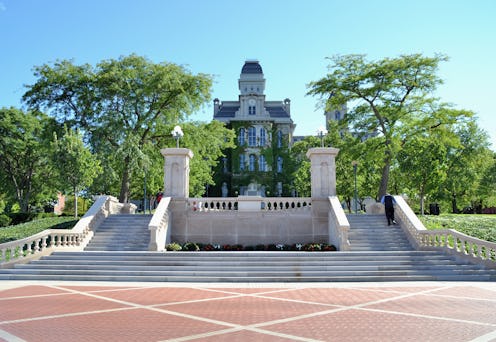News
Syracuse U. Makes Awesome Pro-Environment Move

Syracuse University announced Tuesday that the private research institution would be divesting Syracuse's $1.2 billion endowment from direct investments in fossil fuel companies. The decision follows years of student protests and a February meeting between the administration and Divest SU, a group of student activists intent on separating their university from fossil fuel investments. The sea change in university policy places Syracuse among the growing number of universities, municipalities, church organizations, and private groups that have refused to support an industry that many say is responsible for heating the planet to dangerous temperatures.
With the administration’s decision, Syracuse becomes the U.S. university with the largest endowment to pursue a full divestment from fossil fuels. Stanford University, in turn, has a larger endowment at $21.4 billion, but its divestment promises have thus far been limited to any direct investments in any coal mining companies. Same with the University of Maine system, which made headlines in January for announcing its intent to withdraw financial support from the coal industry.
Syracuse, however, broke new ground by expanding its divestment strategy to encompass any “publicly traded companies whose primary business is extraction of fossil fuels.” In a statement, the university noted that it would instruct its external fund managers to stay away from the groups.
Syracuse Chancellor Kent Syverud explained his administration’s shift on divestment in a statement:
Syracuse has a long record of supporting responsible environmental stewardship and good corporate citizenship, and we want to continue that record. Formalizing our commitment to not invest directly in fossil fuels is one more way we do that.
The university also promised to look for ways to invest in alternative energy companies and industries, including “solar energy, biofuels and advanced recycling.”
Divest SU welcomed the news on its Facebook page, but noted that the move does not represent a full divestment as Syracuse does not have any direct investments in the fossil fuel industry at the moment and instead is predominantly implicated through funds that comingle stock from suspect and climate-neutral companies. As the student group posted on social media:
This is a big step forward, but we will not rest until SU does not have a single cent invested in these companies.
Syracuse’s announcement Tuesday is largely a success story born of student activism. After years of calling for divestment and for a greater university commitment to combating climate change, students managed to raise the public profile of the issue enough to move the administration to act. The Syracuse University Student Association voted in April 2013 to push the private institution to divest; the University Senate followed in the footsteps of the student group a year later. But the Socially Responsible Investment Matters Committee ignored the student and faculty recommendations and decided against pursuing a divestment strategy at a summer meeting.
And so the students escalated things. Last fall, more than 50 student groups joined forces to form The General Body, a coalition of activists dedicated to fighting for increased transparency in university operations, greater respect for diversity and inclusion on campus and more support for students and teaching staff alike. After holding a rally on Nov. 5, the students began an 18-day sit-in inside one of Syracuse’s main administrative buildings. The General Body put together a 43-page list of grievances and action items for the Syracuse administration, including a call for full divestment from fossil fuel companies.
Over the nearly three-week action, faculty members and the community cycled through the building to show their support for the students, participating in teach-ins and bringing food and supplies. Officers kept an eye on the students around the clock and barred them from bringing food into the building at night or over the weekends when the facility was ostensibly closed.
But after days of back and forth, the students called off the sit-in and managed to get the Syracuse administration to agree to certain demands, including a 7 percent raise for teaching assistants in 2016 and a meeting to discuss divestment. When it comes to making steps towards aligning the University’s funding sources with its students’ ethical commitments, the dialogue has born fruit. But as Divest SU acknowledges, there is still a long way to go before Syracuse lives up to its students’ ethical commitments on climate policy.
Images: JPellgen/Flickr; Getty Images (3)